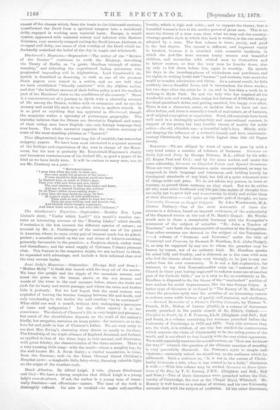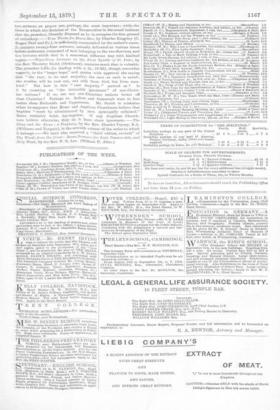SERMONS.—We are obliged by want of space to pass by
with a very brief notice a number of volumes of Sermons. Sermons on Daily Life and Duty, by George Dawson, M.A., edited by his wife. (C. Regan Paul and Co.) ; and by the same author, and under the same editorship, Sermons on Disputed Points and Special Occasions. Those are very vigorous dis courses, quite unconventional, as may be supposed, in their language and treatment, and holding loosely by- theological standards of any kind, but full of a quite vehement love' of things noble and pure. We do not advise any parson, in town or country, to preach these sermons as they stand. But we do advise• all who want some freshness and life put into habits of thought that are sadly apt to grow dull and monotonous, to study and utilise them at their discretion.—At quite an opposite pole of thought, we have University Sermons on Gospel Subjects. By John. Wordsworth, M.A. (James Parker.)—One of the most noticeable of these dis- courses is a defence, based on internal evidences, of the authenticity of the disputed verses at the end of St. Mark's Glaspel. Mr. Words-. worth sees in them a remarkable harmony with the Evangelist's treatment of the subject of miracles. " St. . John a Teacher of Teachers," sets forth the characteristic of another of the Evangelists. Four other sermons are devoted to the subject of the Temptation. —A volume of " Sermons and Lectures," under the title of Priestcraft and Progress, by Stewart D. Hoadlam, B.A. (John Hodge),. is, as may be supposed by any one to whom the preacher may be known by report, not of an ordinary kind. Mr. Headlam speaks his mind fully and frankly, and is disposed, as is the" case with men who feel the abuses about them very strongly, to be just to any one- rather than his own community. It is not a fair explanation, for instance, to say that Nonconformists exist on. " account of the Church in times past having neglected to enforce some one or another part of the Catholic faith;' nor is it easy to fix, as confidently as Mr. Heacilam is disposed to do, the blame of the " unattached " position of men zealous for social improvement, like the late George Odger. A better type of discourse is to found in "The Rosary of St. Michael,"" where the preacher aptly uses the occasion of an interesting custom to enforce some noble lessons of purity, self-restraint, and obedience.
Revived Memories of a Pastor's Parting Counsels, by Thomas V. French, D.D., Bishop of Lahore (Poole), is a volume of discourses mostly preached in the parish church of St. Ebbe's, Oxford.— Disciples in Doubt, by J. B. Pearson,.LL.D. (Doighton and Bell ; Bell and Sons), is a volume containing five sermons preached before the University of Cambridge in 1876 and 1879. Very able sermons they are, the work, it is evident, of one who has studied the controversies which concern the claim of Christianity to be the ruling power of the world, and is not afraid to deal frankly with the very ablest opponents. We would especially mention the second sermon, oil "How can we know the way ?" wherein the question of the ultimate sanction of morality is very powerfully discussed. Dr. Pearson's style" is simple and vigorous,—omiuontly suited, we should say, to the audience which he addressed. Such a sentence as, "It is not in the nature of Christ-
ianity to remain.' a rule, when it has ceased to be a faith," illustrates it well.—With this volume may be ranked Sermons on Some Ques-
tions of the Day, by T. G. Bonney, F.H.B. (Doighton and Bell ; Bell and Sons.)—Two of these discourses were preached before the Uni- versity of Cambridge, the rest at the Chapel Royal, Whitehall. Bonney is well known as a student of science, and his two University sermons deal with the subject of evolution, Of the other diseourse)5
two.sermons on prayer are, perhaps, the most important ; while the three in which the doctrine of the Resurrection is discussed indicate that the preacher, liberally disposed as ho is, occupies the firm ground of orthodoxy.—True Words for Brave Men, by Charles Kingsley (C. Kogan Paul and Co.), is sufficiently commended by the author's name. It contains twouty.four sermons, actually delivered at various times before audiences, composed of men belonging to the two Services, and five lectures which deal in a somewhat different way with kindred topics.---Ewpository Lectures on the First Epistle of St. Peter, by the Rev. Thornley Smith (Dickinson), contains much that is valuable. The preacher holds (in dealing with c. iii., 18-22), though somewhat vaguely, to the "larger hope," and quotes with approval the saying that "the race, in its vast majority, the race as such is saved ; the residue will be cast out, not only from God, but from man- kind." But how is this " vast majority " arrived at ? Is it by counting on "the invincible ignorance" of non-Christ- ian nations P If so, are not non-Christian nations better off than Christian P Perhaps so. Sodom and Gomorrah were to fare -better than Bethsaida and Copernaum. Mr. Smith is mistaken when ho supposes that Rome and Anglican Churchmen believe that baptism " must be administered by men episcopally ordained." Rome certainly holds lay-baptisre• If any Anglican Church. men believe otherwise, they do it from sheer ignorance.—The Sling and the Stone : a Propheev, by the Rev. Charles Voysey, B.A. (Williams and Norgate), is the seventh volume of the series to which it belongs.—We have also received a "third edition, revised," of The Words from the Cross Seven Sermons for Lent, Passion-tide, and Bogy Week, by the Rev. F. G. Lee. (William H. Allen.)



































 Previous page
Previous page